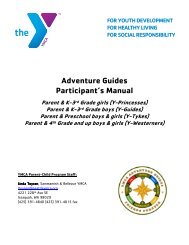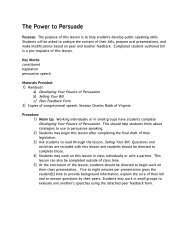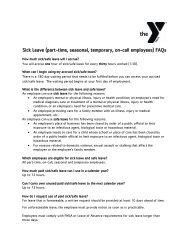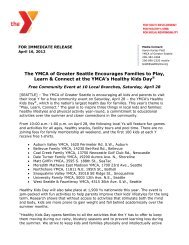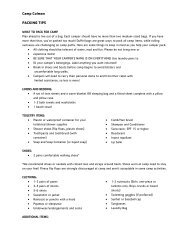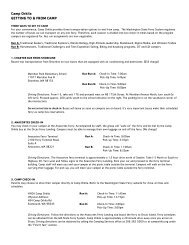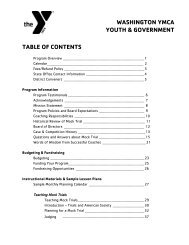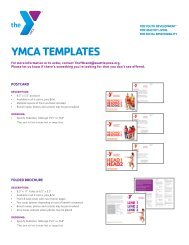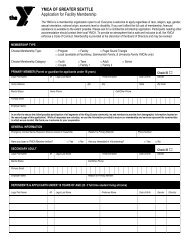washington mock trial rules of evidence - YMCA of Greater Seattle
washington mock trial rules of evidence - YMCA of Greater Seattle
washington mock trial rules of evidence - YMCA of Greater Seattle
You also want an ePaper? Increase the reach of your titles
YUMPU automatically turns print PDFs into web optimized ePapers that Google loves.
opposing party delves into the subject deeper on cross-examination. For example, the<strong>rules</strong> <strong>of</strong> <strong>evidence</strong> provide that in a criminal case only certain prior convictions may beintroduced by the prosecution during cross-examination <strong>of</strong> the defendant to attack his orher character. However, if during direct examination the defendant testifies that he or shehas led an exemplary life and would never think <strong>of</strong> shoplifting a leather jacket, the defensehas opened the door to permit the prosecution to explore the defendant's criminal historyfar beyond the scope that would have been permitted if the defendant had not reported hisexemplary record for good citizenship. It should be noted, however, that the court willalways exercise its discretion to limit the scope <strong>of</strong> examination in such collateral mattersso that the <strong>trial</strong> does not stray from its principal issues.(K) Scope <strong>of</strong> Direct, Redirect and Cross-Examination. Direct and cross-examination maycover all facts relevant to the case <strong>of</strong> which the witness has first hand knowledge or hasspecial training and knowledge sufficient to permit the witness to <strong>of</strong>fer an opinion, and anyother matter permitted by these Rules <strong>of</strong> Evidence. Cross-examination is not limited to thescope <strong>of</strong> direct examination. Re-direct examination is limited to the scope <strong>of</strong> the crossexamination.Recross examination is limited to the scope <strong>of</strong> redirect examination.(L) Specificity Required. An objection must be specific.Comment: Whenever possible, an attorney making an objection must state the specificbasis for the objection by citing the rule <strong>of</strong> <strong>evidence</strong> or law which supports the objection,or by stating the basis in the form <strong>of</strong> a word or phrase which informs the judge <strong>of</strong> thebasis. (See examples listed below.)If a party's objection does not include a statement <strong>of</strong> the legal reason supporting it, e.g.,when an attorney simply says, “Objection,” without telling the court why the objection wasmade, it is termed a “general objection.” General objections are not prohibited per se, butthe court may, in its discretion, refuse to sustain an objection which is not specific. On theother hand, when general objections are made to questions which are obviouslyobjectionable, the court will usually rule on them even without a statement <strong>of</strong> the specificbasis. For example, the judge may not need to be informed <strong>of</strong> the specific basis to rule ona question which is obviously leading (“Would you say the car was going around 50 milesper hour?”) or one which obviously calls for a hearsay response (“What did Ms. Jones sayto the police <strong>of</strong>ficer?”).Objections to the “form <strong>of</strong> the question” and “lack <strong>of</strong> foundation” are acceptable specificobjections. When an attorney objects to the form <strong>of</strong> the question, he or she may becomplaining that the question calls for a narrative response, is compound, is too broad, istoo complex, is argumentative, or is defective in some other general way. The purpose <strong>of</strong>



